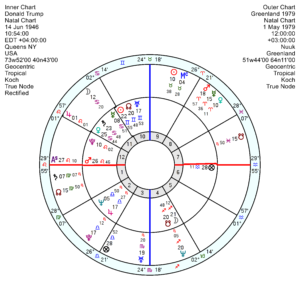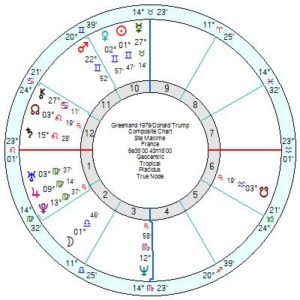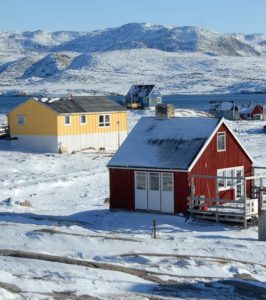Offering to buy Greenland is clear sign that Trump has lost the plot altogether according to the Washington Post. Although evidently wikileaks indicated the USA is highly interested in investing in the resource base of Greenland and in tapping hydrocarbons off the Greenlandic coast.
Greenland is the largest island in the world, an autonomous Danish territory, with a population of 56,000 people living around the coastline. Almost 90% are indigenous Greenlandic Inuit people. It has a limited self-government and its own parliament. More than 80% of the island is covered by an ice cap. Global warming is feared to be causing the ice cover to melt increasingly quickly but has also increased access to its mineral resources. In 1941 the USA occupied Greenland to defend it against invasion by Germany who had already taken over Denmark and handed it back in 1945. Following World War II, the US developed a geopolitical interest in Greenland, and in 1946 offered to buy it from Denmark for $100,000,000. Denmark refused to sell.
Greenland was granted home rule on 1 May 1979 which gives a Taurus Sun trine Saturn in Virgo; with Mars in Aries opposition Pluto. The Greenland Pluto is exactly conjunct Trump’s 2nd house Jupiter – so it clearly sets his cash register bells ringing. The Greenland Neptune opposes his Sun sending him off into an Aladdin’s Cave dreamworld of endless wealth.
His astrocartography put his Sun MC line through the middle of Greenland which will spark off his ambitions – not that he’d want to park himself in an igloo, but perhaps when climate change has done its maximum damage he could build a holiday resort where the ice cap used to be.
His relationship chart with Greenland 1979 has an affectionate composite Sun Venus in an adventurous and expansive square to Jupiter Uranus. Clearly it sets his juices racing. Though it ain’t ever going to happen.




The Chinese are already there. They have begun investing in the mining industry on the island.
Another point is the Inuit long-standing dream of an independent nation which would also include the Canadian territory of Nunavut and perhaps the Arctic region of Quebec known as Nunavik. In this view, the independence of Greenland is only the first building block. A vision for 2100, perhaps?
Given the way Nation/States have moved over the Centuries, wouldn’t be surprised
if there is some alignment/new Federal system merging with Canada, even Mexico years from now.
I know there are future trenders predicting this, but can’t recall their names at moment on the train.
Have a great weekend Marjorie!
Glad I asked, thank you Marjorie!
I learned this morning that Greenland’s underground wealth might include major rare earth deposits. These are of immense strategic value as they are key components of smartphones and other things deemed vital in the electronic age. China presently has a near-monopoly on rare earth deposits. China and the US would logically be competing for such deposits in Greenland.
Marjorie and Andre have explained this so well! I was going to google this “Greenland” thing and now I don’t have to—one stop at Star4Cast got me up to speed.
Andre also explained one of the hidden undercurrents to Scottish independence.
This is a great read, thank you Marjorie!
(By the way, it may never happen, but wouldn’t be surprised if there’s some realignment with Canada 1 day, have read
quite a lot of merging papers (too long to mention here + references) but there is a very good book
by Diane Francis entitled, “Merger of the Century” where she sets out 5 possibilities.
Have a nice weekend!
Marjorie, there is more going on here. Denmark signed an agreement on autonomy with Greenland about 20 years ago that recognized the right to independence from 2021. As a Guardian article states today, the overwhelming majority of Greenlanders favors independence, but is concerned about the loss of Scandinavian-level social programs and Danish financial support. The hope in the Nineties was that oil deposits and mining would provide matching revenue, but this hope has not materialized and is now replaced by environmental concerns. Enter China and the strategic value of an Arctic sea route through disputed Canadian waters. There are now strategic planning and competing visions for a major Arctic port in the North Atlantic for Asian and other ships passing near the North Pole. A leading contender for this port would obviously be an independent Greenland. At the most recent meeting last spring of the Arctic Council, which includes all Arctic states (Russia, the US, Norway, Denmark, Iceland, Canada), indigenous organizations, as well as the autonomous government of Greenland and the Canadian province of Quebec (the only Arctic province), concern was publicly expressed by Pompeo, the US Secretary of State, who unusually attended, that Greenland’s independence would bring a major Chinese military base in the North Atlantic as well as heavy Chinese investment in mining. The Inuit in Greenland are seen as susceptible to Chinese influence because of their Asian origin. This is what is really behind Trump’s upcoming state visit to Denmark in early September. Greenland’s drive for independence is closely monitored in Canada and in Quebec for diametrically different reasons. Scotland may soon not be the only new country in the North Atlantic region.
Thanks. That’s interesting. I remember from Obama’s astrocartography that there was a good deal going on – which possibly wasn’t publicised – up in the frozen regions.
Not entirely correct. There is nothing sacrosanct about the 2021 date.
As part of the self-rule law of 2009 (section §21), Greenland can declare full independence if they wish to pursue it, but it would have to be approved by a referendum among the Greenlandic people. In 2008, independence campaigners touted the year 2021 (the 300th anniversary of Danish colonial rule) as a date for potential independence. So, Greenland can declare independence now, if agreed to in a referendum and the majority are in favour.
But the economy is based on a block grant from the Danish government, equaling about two-thirds of Greenland’s government budget and about one-quarter of the entire GDP of Greenland. That block grant would dry up if Greenland declares independence.
https://en.wikipedia.org/wiki/Greenlandic_independence
It is possible that, to counter that loss of money, an independent Greenland could ally with China (as a part of its Belt and Road initiative), giving China a toehold in the Arctic. That may be behind the US’s talk of buying Greenland.